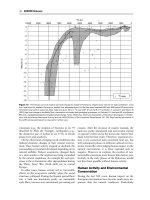Authors libby rittenberg 790
Bạn đang xem bản rút gọn của tài liệu. Xem và tải ngay bản đầy đủ của tài liệu tại đây (415.63 KB, 1 trang )
consuming the good, and the firms providing a public good do not get a
signal from consumers that reflects their benefit of consuming the good.
Certainly we can expect some benefits of a public good to be revealed in
the market. If the government did not provide national defense, for
example, we would expect some defense to be produced, and some
people would contribute to its production. But because free-riding
behavior will be common, the market’s production of public goods will
fall short of the efficient level.
The theory of public goods is an important argument for government
involvement in the economy. Government agencies may either produce
public goods themselves, as do local police departments, or pay private
firms to produce them, as is the case with many government-sponsored
research efforts. An important debate in the provision of public
education revolves around the question of whether education should be
produced by the government, as is the case with traditional public
schools, or purchased by the government, as is done in charter schools.
External Costs and Benefits
External costs are imposed when an action by one person or firm harms
another, outside of any market exchange. The social cost of producing a
good or service equals the private cost plus the external cost of producing
it. In the case of external costs, private costs are less than social costs.
Similarly, external benefits are created when an action by one person or
firm benefits another, outside of any market exchange. The social benefit of
an activity equals the private benefit revealed in the market plus external
Attributed to Libby Rittenberg and Timothy Tregarthen
Saylor URL: />
Saylor.org
790









